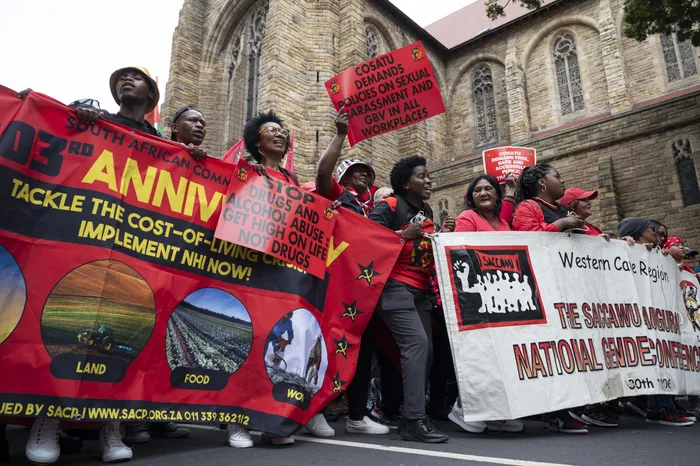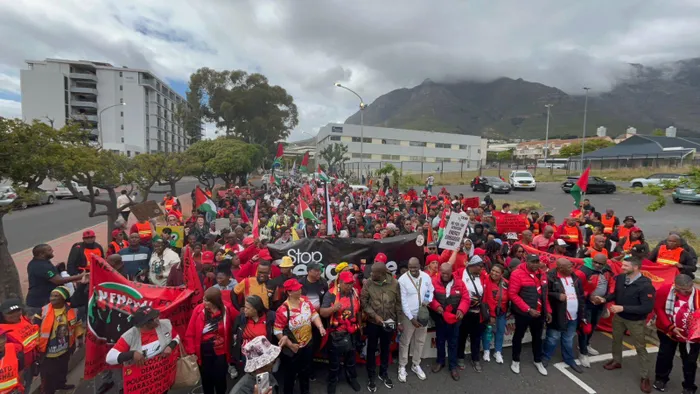
The Congress of South African Trade Unions (COSATU) marched through the streets of Cape Town on Tuesday to observe the International Day for Decent Work with a National Day of Action. The Congress says this action is centred on retrenchments, weak economic growth, and the rising cost of living.
Image: Armand Hough / Independent Newspapers
A group of about 300 Congress of South African Trade Unions (Cosatu) members and supporters marched through the city centre to deliver a memorandum of grievances to the three spheres of government, calling for decent and sustainable employment.
The marchers gathered in Hanover Street before proceeding to the Provincial Legislature and later to the Civic Centre.

Cosatu marched to the Provincial Legislature and to the Civic Centre to demand decent jobs and a safer Cape Town.
Image: Mandilakhe Tshwete
Cosatu provincial secretary Malvern de Bruyn said: “We marched to the Provincial Legislature as well as to the Provincial Parliament, but this time around, we did it differently. We asked the Speaker of the National Parliament to come to the Legislature to collect the memorandum."
“The memorandum talked about the question of decent jobs for our people. It also addressed the issue of crime in the province. We referred to the issue of the Palestinian crisis and what we wanted our government to do. Then, we went to the City of Cape Town from there. We handed over the memorandum to the Mayor’s Office, and that memorandum also talked about the question of high electricity tariffs, high water tariffs, the question of the anti-poor budget.”
De Bruyn said Cosatu had previously engaged with the Premier’s Office but was not convinced that the provincial government was doing enough to address job creation.
He criticised the reliance on the Expanded Public Works Programme (EPWP), arguing that it failed to provide sustainable employment or basic worker benefits.
“There is a need for people to clean streets and work on trucks that collect waste, but why did we use EPWPs?” he asked.
“Those people have been deprived of medical aid, pension funds, and other benefits. They are getting paid less than R20 an hour. The DA and the City are hiding behind the EPWPs instead of creating real jobs.”
Western Cape Government Director-General Harry Malila said the provincial administration had a plan to grow the economy and expand employment opportunities.
“As part of our provincial strategic plan for the next five years, we wanted to grow the economy because that would enable the private sector to do what they needed to do,” said Malila.
“In that plan, we wanted to create 600 000 jobs over the next five years, at least up until 2026.”
He said the province’s unemployment rate stood at about 21%, and although the Western Cape accounted for “90% of the net jobs created in South Africa over the last two to three years”, more needed to be done.
“The 600 000 jobs we want to create up until 2035 were a steep target, but it would depend on the economy growing at about 3.5%. We believed business created jobs, and if we enabled the business sector through our initiatives, we would be able to achieve that,” he said.
Malila added that the EPWP should be seen as a stepping stone rather than a permanent solution.
“EPWP was an entry to work towards a proper, permanent job. It was an opportunity for young people to gain exposure and skills, but it could not be the ultimate job. The ultimate job provides dignity; nothing puts food on the table like a job. Nothing created dignity like a job. Nothing stops a bullet like a job.”
In solidarity with the march, the Palestine Solidarity Campaign (PSC) joined the protest, linking the struggle for decent work in South Africa with global justice.
PSC coordinator Professor Usuf Chikte said: “The day marked two years of the genocide, the Holocaust, and apartheid in Palestine. We stood in solidarity with Cosatu in the international call for decent work. Our labour, our life, and our liberty were connected. We could not be unemployed and live a decent life.”
The union has given the government 14 days to respond to their demands.
Related Topics: